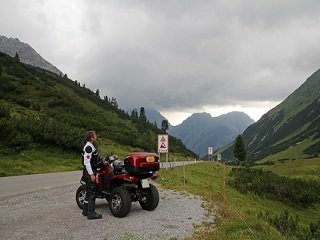 Winter sports enthusiasts like snowmobilers are well-known for the care they take in preparing and carrying emergency packs on their sleds. ATV drivers are generally more casual, but would be smart to follow that example. Sure, you think you won’t need it and hopefully you won’t, but there’s safety and security in a kit that lets you deal with basic first aid needs, start a fire, do minimal mechanical repairs, or spend an unexpected night outside with some extra warmth and comfort.
Winter sports enthusiasts like snowmobilers are well-known for the care they take in preparing and carrying emergency packs on their sleds. ATV drivers are generally more casual, but would be smart to follow that example. Sure, you think you won’t need it and hopefully you won’t, but there’s safety and security in a kit that lets you deal with basic first aid needs, start a fire, do minimal mechanical repairs, or spend an unexpected night outside with some extra warmth and comfort.
It doesn’t really matter if you live and ride in a cold or warm climate. Being thrown from your ATV can cause injuries that immobilize, technical breakdowns could leave you stranded, and nights everywhere can be uncomfortable, perhaps with temperatures that drop low enough to make the risk of exposure and frostbite a very real threat.
Keep some tools with your machine, either in a fixed bag or the permanent storage compartment of your ATV. Include a spark plug wrench, along with one or two other wrench sizes, and a couple of screwdrivers. Have an extra sparkplug, some needle-nose pliers, duct tape or electrical tape, and a good flashlight with fresh batteries. You should have a spare belt, and know how to change it. If you’re not mechanically inclined, it’s time well spent to have someone who knows what they’re doing show you how to make simple basic mechanical repairs. Don’t wait until you’re miles away from help in the wilderness to give changing a belt or replacing a plug a first try! Practice beforehand, so you understand how everything works. A ‘dress rehearsal’ will give you confidence, and the knowledge of how to handle a real breakdown if it occurs.
If your fixed bag or storage compartment is waterproof, add a fire-starter kit and extra matches. Other helpful items to include: a tow strap, siphon hose, and a few road flares to use if you need to signal for help. In your personal pack, carry dry clothes and extra gloves, a hat, energy bars, a few plastic garbage bags (great as insulation or for makeshift rain gear) and a compact space blanket. Add a compass and a boater’s whistle. Carry your personal pack with you, on your person.
Of course you should always let someone responsible know where you are going and when you plan to return. Your emergency kit is really your insurance policy; by planning for the worst, you will be prepared for the unexpected.








